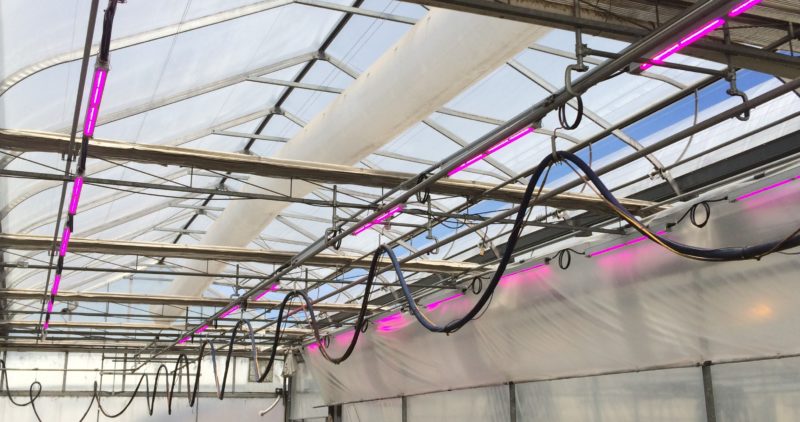
Selecting an LED Fixture
Horticultural lighting fixtures containing arrays of lightemitting diodes (LEDs) abound. Established plant lighting companies, companies with general illumination but not horticultural lighting expertise, and small start up companies are increasingly developing and marketing them.
With so many LED products now on the market, and more on the way, choosing the right LED fixture is a crucial decision. Below are factors to consider when choosing an LED fixture for plant applications.
Application. There are three major lighting applications: low-intensity greenhouse lighting to create long days and regulate flowering, moderate-intensity supplemental greenhouse lighting to increase growth, and high-intensity sole-source lighting for indoor use. Each LED fixture model usually only has one application, so be sure they match. For example, sole-source lighting fixtures are usually not designed for greenhouse use.
Durability. Fixtures should be constructed to tolerate horticultural (greenhouse) conditions such as high humidity and high temperature. Recently, the American Society of Agricultural and Biological Engineers released a second standards document on methods for measuring and testing of LED products for plant applications. This document formalizes the need for horticultural lighting fixtures to withstand damp and moderately hot conditions.
Longevity. The standards document also requires reporting of long-term performance changes to LEDs (i.e., the expected lifetime). For a product to be listed by the DesignLights Consortium (DLC), LED fixtures should operate at least 36,000 hours before light output decreases to 90 percent of its initial value. Therefore, look for product guarantees or warrantees that meet or exceed this value.
Efficacy. The photosynthetic photon efficacy (PPE) refers to the total quantity of photosynthetic photons emitted from a fixture per second (μmol·s–1) per Watt of electricity. The unit for efficacy is μmol·J–1, with higher numbers indicating a more efficient fixture. While this value is an important factor when choosing a fixture, it can be overemphasized. As a guideline though, look for LED products with a minimum PPE of 2.0 μmol·J–1 and preferably at least 2.5 μmol·J–1. Do not purchase products unless the PPE is explicitly reported.
Light uniformity. The intensity and variability of light emitted from fixtures to a growing surface are equally important. Growers should have a target light intensity at installation, as well as a tolerance in uniformity. Generally, the installed light intensity should not deviate more than 20 percent across the growing area.
Cost. The greatest barrier to commercial implementation of LEDs is economics. In some cases, such as seasonal use of supplemental greenhouse lighting, conventional fixtures (such as high-pressure sodiums) are still more economical. Work with a reputable lighting company to generate a lighting plan, which will indicate the number and position of fixtures needed to deliver the desired light intensity. LEDs are usually more expensive, but can lower operating costs offset the higher investment cost within a reasonable (three or four year) period?
Ease and cost of installation. Some LED fixtures are easier and less expensive to install than others. Be sure the installation cost, including additional electrical supply (if needed), is included when you compare costs for different lighting fixtures.
Light spectrum. LED fixtures have a wide range of emission spectra, but most emit a whitish, pinkish, or purplish light. Usually the purple light-emitting fixtures have the highest PPE values, but they can be rather unpleasant to work under, especially at night. Thus, while fixtures are primarily for plant applications, also consider the visual effects.
Minimal shading. Some LED (as well as conventional) fixtures are quite large, which when installed in a greenhouse, shade plants below. Consider the surface area (length × width) of the fixture and the number of fixtures needed to deliver the desired intensity, with the objective of minimizing the shading factor.
Customer service. There is a lot of demand for horticultural lighting now, and some companies are better than others at returning phone calls, answering questions in a timely manner, etc. Ask them for customer referrals or testimonials, as well as fixture warrantees and/or guarantees. If some fixtures fail, how will they respond? Will the company still be in business?
Eligible for utility rebates. Work with your utility company to determine whether you can obtain a rebate if your fixture meets certain criteria. Some rebates can be large enough to change the investment decision of one lighting fixture over another. Thus, include any rebates in your economics calculations.








 Video Library
Video Library 

















